

How To Choose Your Library School. With 63 accredited programs to choose from, assessing which is best is far from clear cut.
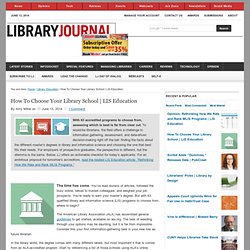
To would-be librarians, the field offers a challenge in information gathering, assessment, and data-driven decision-making right off the bat: finding the facts about the different master’s degrees in library and information science and choosing the one that best fits their needs. For employers of prospective graduates, the perspective is different, but the dilemma is the same. Below, LJ offers an actionable checklist for today’s applicants. For an ambitious proposal for tomorrow’s accreditors, read the related LIS Education article: “Rethinking How We Rate and Rank MLIS Programs.” The No-Fail Secret to Writing a Dissertation. Want to swap writing strategies?
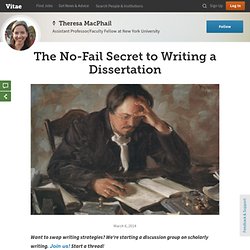
We're starting a discussion group on scholarly writing. Join us! Start a thread! As a former journalist, assistant professor, and seasoned dissertation-writing-workshop coach at New York University, I can promise you there is only one fail-safe method, one secret, one guaranteed trick that you need in order to finish your dissertation: Write. Core Competencies. See competencies mapped to classes.
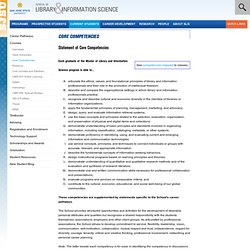
Each graduate of the Master of Library and Information Science program is able to... These competencies are supplemented by statements specific to the School's career pathways. The School provides structured opportunities and activities for the development of desirable personal attributes and qualities but recognizes a shared responsibility with the students themselves, associations, employers and other client groups.
As articulated by professional associations, the School strives to develop commitment to service, flexibility, leadership, vision, communication, self-motivation, collaboration, mutual respect and trust, independence, respect for diversity, courage, tenacity, critical and creative thinking, professional involvement, networking and personal career planning. CrossMark® for Researchers. CrossMark – Cite with Certainty “Standing on the shoulders of giants” is how Isaac Newton described his scientific success.
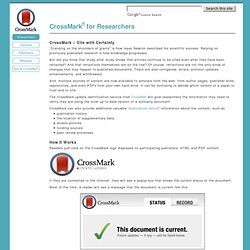
Relying on previously published research is how knowledge progresses. But did you know that study after study shows that articles continue to be cited even after they have been retracted? Using Pinterest to Take School Notes. Using Pinterest to Take School Notes by Silvia K.
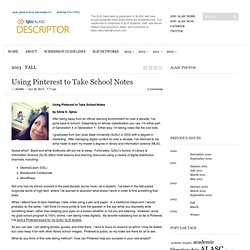
Spiva After being away from an official learning environment for over a decade, I’ve gone back to school! Depending on whose classification you use, I’m either part of Generation X or Generation Y. Either way, I’m taking notes like the cool kids. I graduated from San José State University (SJSU) in 2002 with a degree in marketing. Researcher’s Corner: What Skills and Knowledge do Today’s Employers Seek? I’m a little embarrassed to admit it, but it is only since graduating from SJSU that I started noticing and appreciating the work that goes into shaping the program.
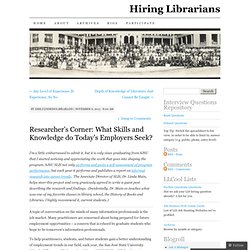
SJSU SLIS not only performs and posts a self-assessment of program performance, but each year it performs and publishes a report on informal research into career trends. The Associate Director of SLIS, Dr. Breaking: Southern CT State University Library School Loses ALA Accreditation. Now that I have a moment to sit still, I was all ready to talk about presenting at New York Comic-Con, the Internet Librarian conference, I Need a Library Job, and all sorts of other things – but then late yesterday afternoon, the news from WNPR radio (yes, that IS the callsign of our local NPR affiliate in CT) that Southern CT State University’s library school lost its accreditation from the American Library Association trumped all of the above.
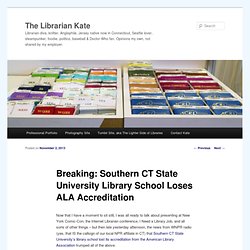
This now means that there is no accredited library school program in my home state of Connecticut, and there is only one accredited public library school in New England, the University of Rhode Island. Slis23thingsbuddies. First semester and Last semester. Stats and Graphs: Biases Against Online Library School. It’s STATURDAY!
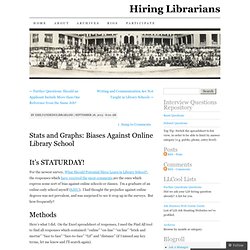
For the newest survey, What Should Potential Hires Learn in Library School? , the responses which have received the most comments are the ones which express some sort of bias against online schools or classes. 23 Things for SLIS Students & Alumni: Essentials for Professional Success. Metadata: Organizing and Discovering Information. Only 3 days left to apply! ‘Time’ CC by Jonathan Bliss Thinking about about applying for the next round of peer-mentoring partnerships?
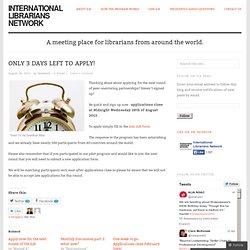
Haven’t signed up? Be quick and sign up now - applications close at Midnight Wednesday 28th of August 2013. To apply simply fill in the Join ILN form. The response to the program has been astonishing and we already have nearly 300 participants from 40 countries around the world. Please also remember that if you participated in our pilot program and would like to join the next round that you will need to submit a new application form. We will be matching participants very soon after applications close so please be aware that we will not be able to accept late applications for this round. Stats and Graphs: What Should Potential Hires Learn in Library School? It’s Staturday!
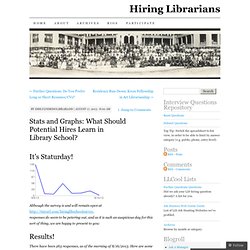
Although the survey is and will remain open at responses do seem to be petering out, and as it is such an auspicious day for this sort of thing, we are happy to present to you: Results! There have been 263 responses, as of the morning of 8/16/2013. Here are some graph-based representations of them. Please be advised this is not science, and you shouldn’t try to extrapolate these trends to the world at large. Do library schools teach candidates the job skills you are looking for in potential hires?
Should library students focus on learning theory or gaining practical skills? 6 Tips on How to Be a Smart and Successful Graduate Student. 6 Tips on How to Be a Smart and Successful Graduate Student. The first plank in my philosophy of librarianship. ‘Tis the season to write what-I-learned-in-2011 posts, and I’ve been turning that over in my head but making no progress, because I’m fundamentally more interested in how to change the world in 2012. But there is one thought that keeps bubbling to the surface, the first plank in my philosophy of librarianship. (Which I haven’t written yet. 5 Essential Rules for Writing Your College Essay.
Few things intimidate high school seniors more than writing their college essays. Perhaps it's the thought of "summarizing" yourself in 650 words (an impossible task) or the vision of a grumpy, elbow-patched, pipe-smoking admissions officer reading it and wielding a big red REJECT stamp on your work (real life is not this dramatic). Whatever the reason, writing the college essay is a daunting task -- and one that requires time, care and thoughtful consideration. It pays to get started early; be willing to discard drafts that aren't working and to give yourself enough time to share your writing with people who can provide useful feedback. Remember: nothing you ever enjoyed reading was a first draft! So it makes sense that the summer before senior year is a good time to begin the process. Coolcatteacher.sharedby. Ranganathan Killed the Library Theorist. I have been thinking a lot about the philosophical underpinnings of librarianship lately and recently reread Andre Cossette’s essay: Humanism and Libraries: An Essay on the Philosophy of Librarianship, (1976) which was recently translated from French by Rory Litwin, and is available from Litwin’s Library Juice Press.
This essay illustrates the lack of philosophical and theoretical thinking in librarianship that has been troubling me as of late, and lays out a “philosophy of librarianship” grounded in the humanist/realist schools of thought that I feel could bring about a renaissance to our profession and pull us out of the malaise that we are currently mired in professionally.
I’ll write more about this in a later post, but I want to focus for a moment on why we are currently in this state in the profession. There is no doubt that S. R. The User Experience + Office Hours Joint Column. If there is a library school in the vicinity, your library probably gets the occasional visit from a student on assignment. With the popularity of distance LIS programs, your library may play host even if there’s not a program nearby. These students come to do coursework, but they’re not just using your tables and chairs—they’re learning by observing. These assignments ask students to visit a library and spend time recording and analyzing something that interests them. Sometimes they require students to pose as library users and ask reference or RA questions. Creating a Library/ LIS Feedback Loop. There’s a lot of consternation out there about training our workforce.
Recent articles from voices in the field of library and information science (LIS) have questioned the value of the MLIS or pointed toward an uncertain and evolving future. Former LJ editor in chief Michael Kelley’s “Can We Talk About the MLS?” Summer Reading Flowchart: What Should You Read On Your Break? How to Give a Killer Presentation. A little more than a year ago, on a trip to Nairobi, Kenya, some colleagues and I met a 12-year-old Masai boy named Richard Turere, who told us a fascinating story. His family raises livestock on the edge of a vast national park, and one of the biggest challenges is protecting the animals from lions—especially at night. Richard had noticed that placing lamps in a field didn’t deter lion attacks, but when he walked the field with a torch, the lions stayed away.
From a young age, he’d been interested in electronics, teaching himself by, for example, taking apart his parents’ radio. What I Gained With My MLIS. 23 Things for SLIS Students & Alumni – New Learning 2.0 Initiative at SJSU SLIS. SLISConnect, SJSU’s School of Library & Information Science student and alumni group, is excited to announce the launch of 23 Things for SLIS Students & Alumni: Essentials Skills for Professional Success. This Learning 2.0 program will offer 23 weekly modules (one module per week) to introduce specific online technologies that are proven and recommended by SLIS students and alumni for academic and professional success.
Created by SLIS students and alumni for SLIS students and alumni, this unique program, in addition to exploring valuable online tools, creates and fosters connections among a community of professionals committed to lifelong and collaborative learning. With three target audience groups, 23 Things will be broken down into 3 segments: New LIS Students, Professional Development and Presentations (focused on current students), and the New LIS Professional.